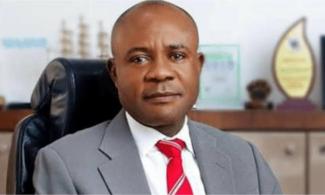
Stallage fees are rates paid by traders for occupying spaces and stores in markets, which are payable to the local governments where the markets are located.
Traders in markets across Enugu State are gearing up for a showdown with the state government over the imposition of a 300 per cent increase in stallage fees in the state.
Stallage fees are rates paid by traders for occupying spaces and stores in markets, which are payable to the local governments where the markets are located.
But in what appears to be a violation of the constitution and usurpation of the powers of the local government areas, the administration of Governor Peter Mbah has been going around all the markets to announce increments ranging from 100 per cent to 300 per cent in rates to be paid by traders.
SaharaReporters’ investigation revealed the first announcement at the Ogbete Main Market where shop owners were told to pay stallage fees directly through the State Inland Revenue Service, rather than the Enugu North Local Government Council.
On Wednesday, October 11, 2023, authorities from the state government visited various markets in Nsukka, where it was announced that fees for shops had increased from N2,600 per annum to between N21,000 and N72,000, which the traders find unrealistic and too astronomical given the prevailing economic hardship.
It was gathered that the traders, who had already paid the rates for the 2023 fiscal year, were being compelled to pay the new rates, a development that has not gone down well with them.
Traders in different markets told SaharaReporters that the government had also refused to explain why rates, which are meant to be collected by local government councils under the law, should be paid to the state government.
They, therefore, vowed to resist the usurpation of powers.
Under the 4th Schedule of the 1999 Constitution of Nigeria, the main functions of local government councils were listed to include, among others, collection of rates, radio and television licences; establishment and maintenance of cemeteries, burial grounds, and homes for the destitute or infirm; licensing of bicycles, trucks (other than mechanically propelled trucks), canoes, wheel barrows and carts and establishment, maintenance, and regulation of slaughterhouses, slaughter slabs, markets, motor parks, and public conveniences.
One of the traders, who spoke on condition of anonymity for fear of victimisation, told Saharareporters that the state government's demand for the payment of an increased stallage rate was both insensitive and a constitutional anomaly.
The source asked why the government would hike fees at a time when traders were hardly making enough sales to break even.
“Since I came to this market as a child helping my father to sell crayfish, we have not paid any fees to the state government. We used to have people we called ‘Market Masters’ who went round the market to collect levies and rates from all the shops in the market. We have never had a situation where the state government came directly to collect fees from us,” he stated.
Another trader in one of the markets, who also spoke on condition of anonymity, also for fear of victimization, described the hike as insensitive, saying the traders were prepared to resist it.
“Look, even if the state government has changed the constitution and can now collect market rates and levies, just take a look at all of us here; do we look like we are making sales that should justify such an increase in rates?
"I do not know where you came here from, but you can see that all the roads people ply to come here have become death traps. Even cars find it hard to come to Nsukka from Onitsha. Trucks can no longer bring goods here because there are no roads. Where do they expect us to get this money from,” he said.
When contacted, the Secretary to the Nsukka Local Government Council, Hon. Mike Ugwu, declined to comment on the issue and directed our reporter to the Enugu State Internal Revenue Service.
When asked if he was aware that the local government areas had exclusive rights over market levies, Ugwu insisted that only the State Internal Revenue Service had the power to speak on the matter.
But a source in the Internal Revenue Service, who also spoke on condition of anonymity, said the state government planned to collect the rates and keep them in a joint account to be shared between the state and the local governments.
When confronted with the provision of the Nigerian Constitution on the responsibility for rates and taxes by the three tiers of government, she hung up and did not answer subsequent calls made by our reporter.